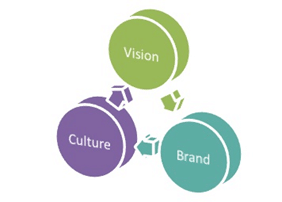Conversations enable communication and connection. Did you know that history tells us in times of crisis like we are currently experiencing we focus on “the task and process of communicating” and because we don’t have answers to possible questions or concerns tend to shy away from deeper connection.
So what does it really matter if you are communicating or connecting – isn’t it just important to have conversations? Sounds like we are getting a little bit pedantic? Take a look and see how we define the difference and why we think both are critical and are best optimised when engaged in a conversation:

The team huddles you might start your day with are generally focused on the tasks to be completed that day and if we are totally honest with ourselves equate to communication. Our attempts at connecting might equate to “how are you doing?”. This global and expansive question lends itself to the global response of “fine” – and we believe this has been a good connection that shows I care as a leader.
All About Conversations
Purpose-filled conversations are essential to connect people emotionally and intellectually while they transition into the new way of working – albeit if it is only as simple as different seating arrangements, new kitchen layout and numbers in the lift!
If we acknowledge a conversation is where two or more people share knowledge, skills, attitudes, values and emotions with  each other in an uninterrupted and unhurried space then spend some time reflecting on how effective you have been at engaging in conversations. For clarity to be created in these conversations then it is essential the message is received in the same way it was intended when sent. In preparing the person to receive the message with the same intent residing in your head, then context is critical before you dive into content. It’s important to always mind the gaps!
each other in an uninterrupted and unhurried space then spend some time reflecting on how effective you have been at engaging in conversations. For clarity to be created in these conversations then it is essential the message is received in the same way it was intended when sent. In preparing the person to receive the message with the same intent residing in your head, then context is critical before you dive into content. It’s important to always mind the gaps!
From our experience, for people to engage in purpose filled conversations – where they are honest, truthful, real and sincere – requires each person to engage with courage and trust.
It’s critical to acknowledge courage and trust are highly personal and only individuals hold themselves accountable for “speaking out”. No one else knows they wanted to speak out or had something to say if they left the conversation without saying what was rattling around in their head.
Connection Is Showing Care
Really showing you care takes energy and time to prepare quality questions – because as I was once told the quality of the information you receive is only as ever as good as the quality of the question you ask! As a leader it is critical to take time to prepare questions that will elicit and create connection with each individual in your team. So instead of asking “how are you doing”……….think about replacing it with questions like:
- I appreciate that last week saw you with a heavy workload, tell me about the most challenging aspect of this for you?
- I know you have two young children at home, what’s been the most challenging aspect for you when juggling work and home this week?
- I have found the uncertainty of our future quite hard to handle this week, and I have noticed how you still manage to bring enthusiasm and positivity into our meetings. What’s your secret, what is working for you?
Communication Is Vital To Performance
As leaders we consistently feel and manage the tension between bringing a focus on the people and a focus on the task. Optimising this balance is essential for business performance and so it is critical we invest time and energy into communication. If we bring the mindset that communication is about the task:
- What needs to get done
- When it needs to be completed by
- Who is involved in its completion
- What everyone’s role is and their level of responsibility
- Quality requirements are explained explicitly and specifically.
There is a time and place for connecting and for communicating and as a leader it is critical you optimise the balance. Talk to us and we can share plenty of purpose-filled conversations that enable such an optimal balance.









